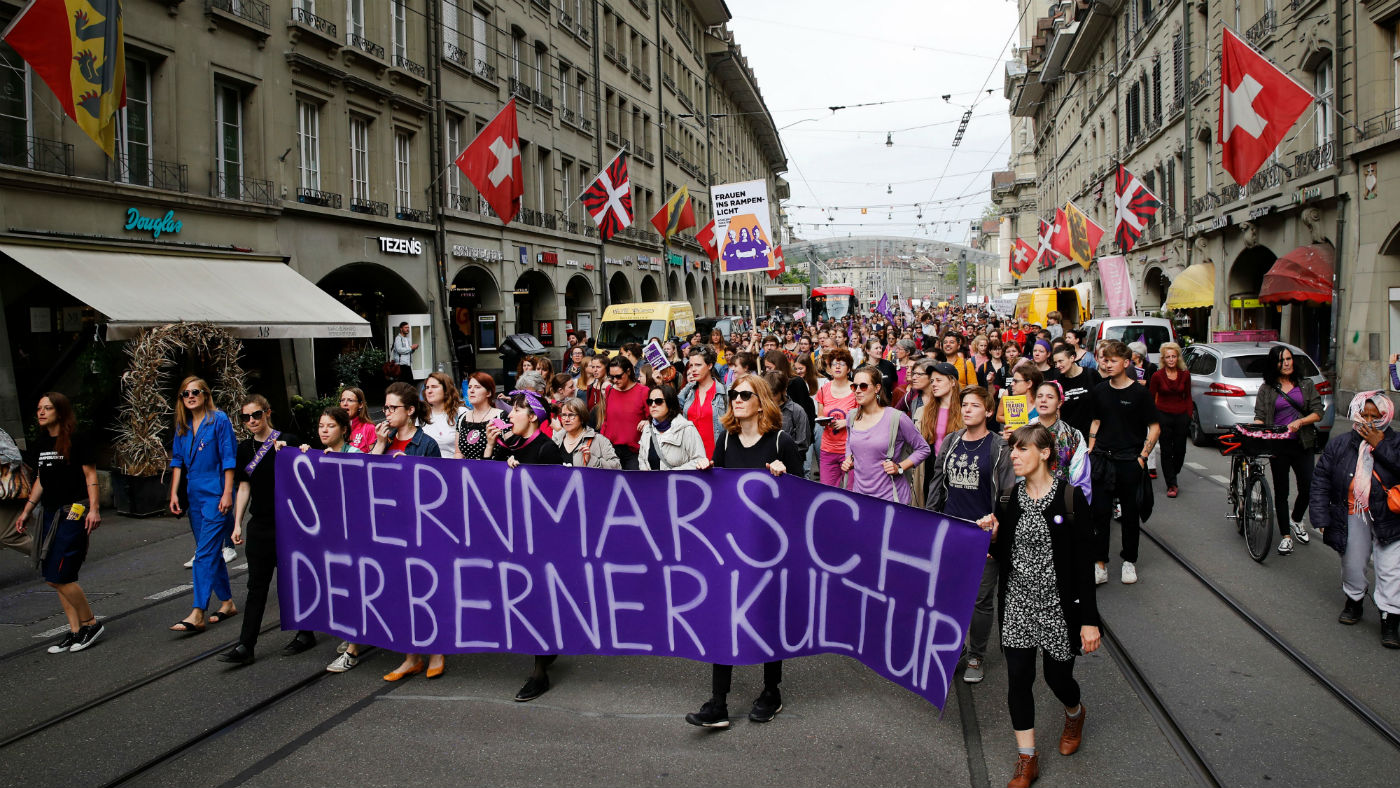Why Swiss women are on strike
Thousands take to the streets to call for quicker progress towards wage equality

A free daily email with the biggest news stories of the day – and the best features from TheWeek.com
You are now subscribed
Your newsletter sign-up was successful
Women across Switzerland are on strike today in protest at the slow progress in tackling the gender pay gap and inequality.
Demonstrators are taking to the streets in the cities of Bern, Sion and Lausanne and, according to the BBC, “every Swiss town and village, from urban centre to alpine farming community, has an activity planned for the day”.
Activist Marie Metrailler said: “The objective is to block the country with a feminist strike, a women’s strike,” French radio station RFI reported.
The Week
Escape your echo chamber. Get the facts behind the news, plus analysis from multiple perspectives.

Sign up for The Week's Free Newsletters
From our morning news briefing to a weekly Good News Newsletter, get the best of The Week delivered directly to your inbox.
From our morning news briefing to a weekly Good News Newsletter, get the best of The Week delivered directly to your inbox.
It is Switzerland’s first national women’s strike since a similar event in 1991, when half a million women took to the streets. At that time, there were no women in the Swiss government and there was no statutory maternity leave, the BBC recalls. One canton had only just given women the vote.
The huge turnout in 1991 was all the more remarkable because it represented one in seven of the 3.5 million women in the small country at the time.
Since the 1991 walkout, there have since been eight female government ministers and there is now a legal requirement for firms to offer maternity leave. But some Swiss women feel there is still a long way to go: they earn on average 20% less than men and rarely have management roles.
The trigger for the new strike was what many saw as an inadequate response to calls for equal pay last year. The government decided to introduce closer scrutiny on equal pay – but only for firms with more than 100 employees, which campaigners said made it meaningless for many Swiss women.
A free daily email with the biggest news stories of the day – and the best features from TheWeek.com
AFP says the turnout for today’s strike “remains uncertain” because industrial action is such a rarity in Switzerland. Some employers, including the national rail company, have said they will respect women’s decision to strike, however.
The BBC says social media campaigning may help to bring out the numbers this year. Organisers hope to witness a sea of purple on the streets, after the colour was chosen to symbolise the strike.
Some women have decided not to take the entire day off, but to reduce their working hours by 20%, knocking off at 3.24pm local time, to represent the 20% gender wage gap in the country. Women not in paid employment have been urged to take a day off from housework.
Swiss men who want to support today’s movement have been asked to stay in the background – enabling their female friends or partners to demonstrate.
Switzerland is not the only European nation to see women strike for equality in recent years. On 8 March 2018, international women’s day, women in Spain walked out of their places of employment.
Hundreds of thousands of Spanish women took to the streets that day, in all the country’s major cities. There were as many as 375,000 marching in Madrid, 220,000 in Valencia and 200,000 in Barcelona.
Spain’s El Pais newspaper boasted at the time: “The strength of the mobilisation in Spain would appear to be unique the world over, turning the country into a leader when it comes to drawing attention to the feminist struggle.”
-
 The ‘ravenous’ demand for Cornish minerals
The ‘ravenous’ demand for Cornish mineralsUnder the Radar Growing need for critical minerals to power tech has intensified ‘appetite’ for lithium, which could be a ‘huge boon’ for local economy
-
 Why are election experts taking Trump’s midterm threats seriously?
Why are election experts taking Trump’s midterm threats seriously?IN THE SPOTLIGHT As the president muses about polling place deployments and a centralized electoral system aimed at one-party control, lawmakers are taking this administration at its word
-
 ‘Restaurateurs have become millionaires’
‘Restaurateurs have become millionaires’Instant Opinion Opinion, comment and editorials of the day
-
 Switzerland could vote to cap its population
Switzerland could vote to cap its populationUnder the Radar Swiss People’s Party proposes referendum on radical anti-immigration measure to limit residents to 10 million
-
 Epstein files topple law CEO, roil UK government
Epstein files topple law CEO, roil UK governmentSpeed Read Peter Mandelson, Britain’s former ambassador to the US, is caught up in the scandal
-
 Iran and US prepare to meet after skirmishes
Iran and US prepare to meet after skirmishesSpeed Read The incident comes amid heightened tensions in the Middle East
-
 Israel retrieves final hostage’s body from Gaza
Israel retrieves final hostage’s body from GazaSpeed Read The 24-year-old police officer was killed during the initial Hamas attack
-
 China’s Xi targets top general in growing purge
China’s Xi targets top general in growing purgeSpeed Read Zhang Youxia is being investigated over ‘grave violations’ of the law
-
 Panama and Canada are negotiating over a crucial copper mine
Panama and Canada are negotiating over a crucial copper mineIn the Spotlight Panama is set to make a final decision on the mine this summer
-
 Why Greenland’s natural resources are nearly impossible to mine
Why Greenland’s natural resources are nearly impossible to mineThe Explainer The country’s natural landscape makes the task extremely difficult
-
 Iran cuts internet as protests escalate
Iran cuts internet as protests escalateSpeed Reada Government buildings across the country have been set on fire